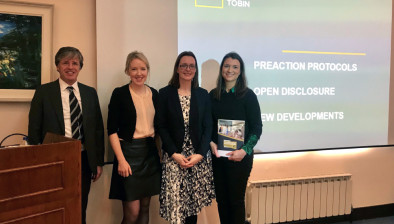High Court: Medical Council decision refusing registration of doctor upheld

The High Court has upheld a decision of the Medical Council refusing registration of a doctor who had been struck off the register of doctors in the UK.

About this case:
- Citation:[2024] IEHC 710
- Judgment:
- Court:High Court
- Judge:Mr Justice Micheál O’Higgins
Delivering judgment for the High Court, Mr Justice Micheál P. O’Higgins considered: “The court’s task in this appeal is to come to its own view on the core issue as to the appellant’s fitness to practice medicine. In my view, there was ample evidence before the respondent to enable it to come to the conclusion that it reached.”
The appellant appeared as a ‘litigant in person’, with Ronan Kennedy SC and Caoimhe Daly BL appearing for the Medical Council instructed by DAC Beachcroft Solicitors.
Background
The appellant practised as a doctor in the UK and was struck off the register by the General Medical Council (GMC) in 2007 following a fitness to practice hearing in which 43 allegations of misconduct were proven against him concerning his dealings with the Healthcare Commission in the context of his providing medical services in unregistered cosmetic and weight-loss clinics and complaints made by four patients concerning treatment provided to them.
The appellant unsuccessfully appealed to the High Court in England, save for two findings against him relating to dishonesty.
The appellant was previously registered in Ireland and in 2017 he applied to have his name restored to the register in Ireland.
Following a two-stage internal process, the appellant’s application was ultimately refused by the Medical Council in 2023 pursuant to s.54 of the Medical Practitioners Act 2007 (as amended) on the basis that he was unfit to practise medicine in Ireland and was not amenable to regulation.
The appellant appealed to the High Court, alleging inter alia breaches of fair procedures, discrimination on grounds of his sexual orientation, bias and complaining that his hearing was not held in public, instead taking place over Zoom.
The High Court
Mr Justice O’Higgins highlighted at the outset that the case raised issues concerning the level of fair procedures to be applied in a registration application, as distinct from a disciplinary hearing.
In particular, the judge disagreed with the appellant’s argument that the nature of his application to the Medical Council was such as to engage Article 6 of the European Convention on Human Rights (ECHR) where same was not an application to discipline the appellant, or to revoke a licence.
In any event, Mr Justice O’Higgins found force in the Medical Council’s contention that the appellant’s rights, if any, were fully safeguarded by his right to appeal to the High Court.
As to the Medical Council’s reliance on the GMC’s decision, the High Court emphasised:
“The fact that a regulatory body in a neighbouring jurisdiction had erased him from the register was plainly a relevant matter that the Council was entitled to consider. To hold otherwise would involve ignoring the respondent’s statutory mandate, including its obligations to protect members of the public and ensure high professional standards among doctors.”
The court noted that the Medical Council was entitled to consider the GMC findings insofar as they had been upheld by the UK High Court and added: “The process before the Medical Council could not on any view be regarded as a rubber-stamping exercise.”
The court also rejected the appellant’s contention that the Medical Council was prohibited from considering his conduct where same did not constitute a criminal offence in Ireland. In this regard, Mr Justice O’Higgins agreed with the Medical Council that “it has never been the law that a person must be convicted of a criminal offence before that person can be the subject of a Fitness to Practice hearing”.
As to the appellant’s complaints that his hearings should not have been conducted on Zoom and that the Review Panel was improperly constituted, Mr Justice O’Higgins found that the appellant had not identified any issue of prejudice or unfairness arising therefrom and had made any such objection before the Review Panel or the Medical Council itself.
Turning to the “low point” of the appellant’s appeal, the High Court remarked that the appellant’s contention that the Medical Council discriminated against him on grounds of his sexual orientation was unsupported by evidence and stressed: “Individuals who give their time to act on behalf of public bodies and boards should not be subjected to wild and unfounded allegations unsupported by evidence… Serious allegations of this nature should not be made unless there is a clear and rational basis for them.”
Turning to the central issue of fair procedures, Mr Justice O’Higgins considered that “purely administrative applications that involve day-to-day subject matter will require little or no formality”, while hearings involving the determination of rights, findings of wrongdoing, reputational consequences or the imposition of sanctions and penalties have more elaborate procedural requirements “akin to those required in a court setting”.
In this regard, the judge found that the hearings provided to the appellant were quite formal with a reasonably sophisticated suite of procedural safeguards in place, in which the appellant’s arguments were properly considered and taken into account. The court also determined inter alia that all relevant materials had been considered, that the correct test under s.54(1) of the 2007 Act had been applied, and that the appellant had been given detailed reasons for the decision.
Furthermore, the court was satisfied that the respondent was entitled to be concerned about the level of insight into his conduct shown by the appellant throughout the entire process and highlighted that the issues suggestive of the appellant being unfit to practice went beyond the findings by the GMC, noting that “the answers given by the appellant in the Q &A session were, to put it mildly, concerning”.
Conclusion
Accordingly, the High Court found that there was no basis for setting aside the decision of the Medical Council and refused the appeal.
Michael John Sheill v The Medical Council of Ireland [2024] IEHC 710








